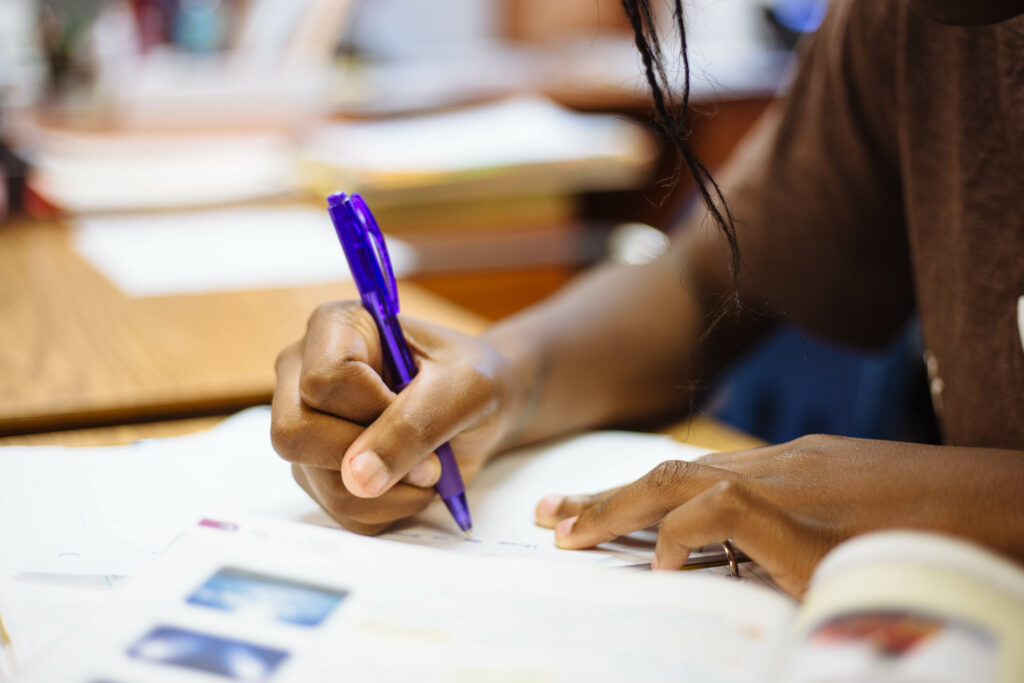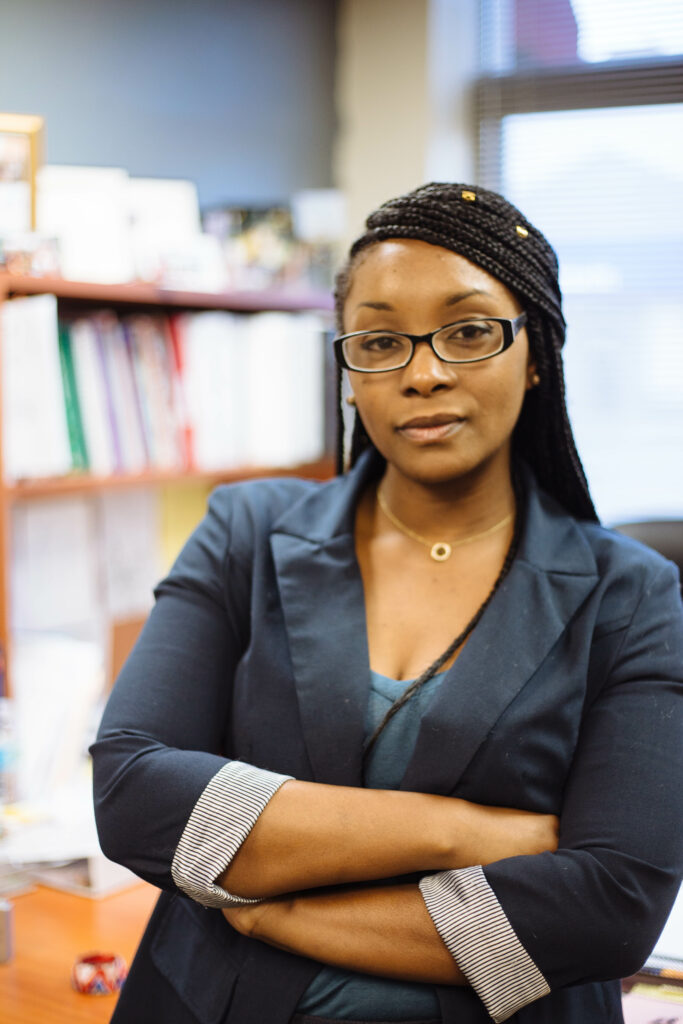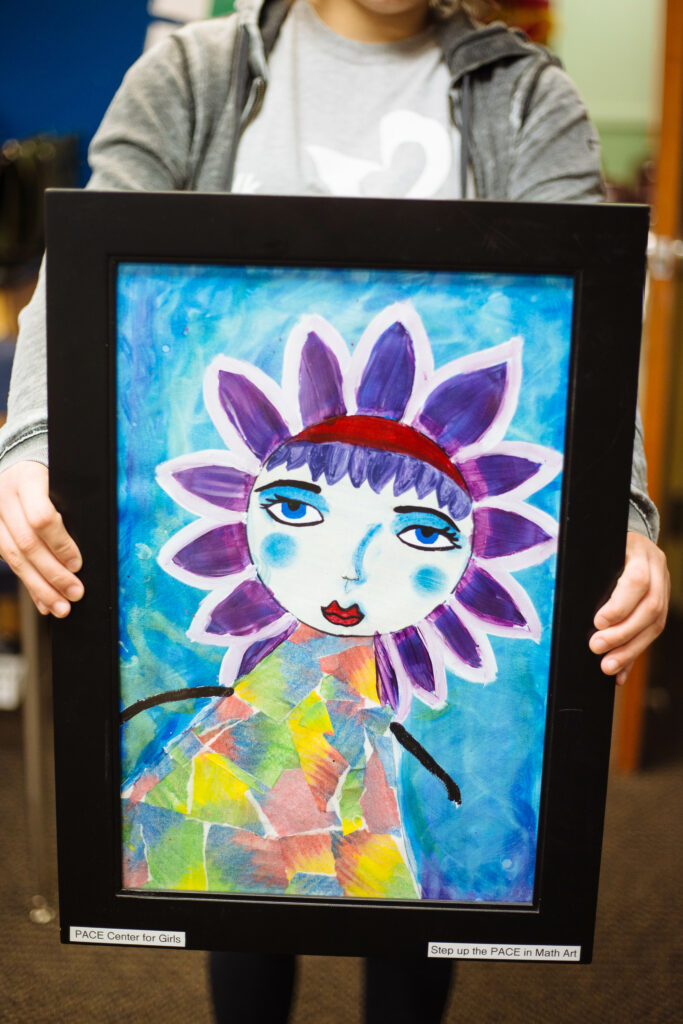CREATING OPPORTUNITIES FOR A BETTER FUTURE
PHOTOGRAPHY BY JOHN KAZAKLIS
Thirty-two years ago, during a time when girls who ended up in the juvenile justice system were sent to programs designed for boys or placed deep within the system for “their own protection,” PACE Center for Girls was born. Girls who ended up in the system could seldom get out, making the hope of a future a distant dream. There were no other alternatives; today, there are also few options for such girls at-risk outside of getting caught in the justice system cycle.
Vicki Burke, PACE’s founder, saw beyond the present, however, and sought a better tomorrow. She thought that if she could identify girls before they got in trouble, she could make a real difference. Armed with research-based alternatives to institutionalization and incarceration, Burke launched PACE in the basement of a church in Jacksonville with just 10 girls, all desperate for a shot at a future. Today, PACE has grown to 19 centers throughout the state. Together, they serve nearly 3,000 girls each year and have changed the stars of more than 39,000 girls in our state.
PRACTICAL, ACADEMIC, CULTURAL EDUCATION
Girls from sixth to 12th grade come to PACE on a referral basis from a teacher, a parent, or sometimes on self-referral. Upon entering the PACE program, girls are often at the lowest point in their lives, strapped with the burden of three or more risk factors like depression, anxiety, drug abuse, truancy, histories of physical abuse, or absent parents due to incarceration or death. The list is long, the future often harrowing.

Last year, Mary Marx, PACE’s CEO, shared a moment with a young girl who, before finding PACE, had suffered repeated sexual abuse at the hands of her uncle. When asked how she found the strength to cope with her experience, she said that her science teacher at PACE recently taught a biology lesson in which she learned that all of the cells in the human body regenerate themselves. She then added that she looks forward to the day, in just a few years, when there won’t be a single cell in her body that was touched by him.
Seeking to solve problems before they are unsolvable, PACE helps girls crawl out of the desperation they face in circumstances beyond their control.
PACE is the only organization of its kind. Seeking to solve problems before they are unsolvable, PACE helps girls crawl out of the desperation they face in circumstances beyond their control. Meeting girls where they are, PACE (which stands for Practical Academic Cultural Education) provides a strength-based environment for students to identify their problems, work through them, and learn coping skills and healing strategies — all while catching up and keeping up academically. Girls attend school year-round but return to their homes and caregivers in the evenings. This model is part of the success; PACE includes the entire family in the process.
It doesn’t take long for PACE to work its magic. Girls come for the short term, usually 12 to 15 months. After completing the organization’s nurturing, healing program, girls learn to thrive in the real world. Ninety-one percent have no involvement with the juvenile justice system after leaving the program (compared to 56 percent who exit the system without PACE). Ninety percent improve academically, and 90 percent pursue higher education, stay in school, or are gainfully employed after completing the PACE program. These success rates ensure a bright future for girls and for us. What’s more, a girl confined in the justice system costs 151 taxpayer dollars a day. PACE costs $62.01 per day. (“Sticker Shock: Calculating the Full Price Tag for Youth Incarceration,” Justice Policy Institute, December 2014).

“PACE is now recognized as a national model for reducing recidivism and improving school success, employment, and self-sufficiency amongst girls by the Annie E. Casey Foundation, Children’s Defense Fund, National Mental Health Association, National Council on Crime and Delinquency, and the Office of Juvenile Justice and Delinquency Prevention” (pacecenter.org/about-us).
WHY GIRLS EDUCATION?
I have been involved with PACE Center for Girls for more than a decade, first as a teacher, then as a contractor. Soon after that, I became a volunteer, joined the board, and today I am humbled to say that I am the Chair of the PACE Polk Board of Directors. To say that this organization runs deep in my veins would be an understatement.
As I think about the important role that girls and young women play in society, I think often about 1995. I was 16 years old, at the beginning of my becoming much like the girls mentioned here today. In 1995, Hillary Clinton delivered the plenary speech at the United Nations Fourth World Conference on Women. I was all ears.
“What we are learning around the world is that if women are healthy and educated, their families will flourish. If women are free from violence, their families will flourish. If women have a chance to work and earn as full and equal partners in society, their families will flourish. And when families flourish, communities and nations do as well.” -Hillary Clinton; speaking at the United Nations fourth World Conference on women
In this speech, Clinton said, “What we are learning around the world is that if women are healthy and educated, their families will flourish. If women are free from violence, their families will flourish. If women have a chance to work and earn as full and equal partners in society, their families will flourish. And when families flourish, communities and nations do as well.”

From that moment, the issues girls face stuck with me. I went on to graduate from high school and college, and then joined Peace Corps where I flew across the globe and landed in Togo where I got to work with girls in West Africa. During that time, I saw firsthand the importance of girls’ roles in community-building. We can read about such things in books and editorials like this one.We can see it in the movies. And, we can hear about it in speeches like Hillary Clinton’s. To live it, though, is an entirely different story.
I saw girls denied access to education because it wasn’t accessible. I saw girls beaten by poverty. I saw girls struggle with sexual abuse in a way that impeded their lives’ motion forward. I saw girls resigned to a singular role in society. Many of these girls and young women were my friends, my colleagues, and my peers.
I was so far from home. Everything was foreign. And, I thought, these issues are issues here. In Togo. In West Africa.
It’s not like this at home.
Then, I came home.
And, I saw girls denied access to education because it wasn’t accessible. I saw girls beaten by poverty. I saw girls struggle with sexual abuse in a way that impeded their lives’ motion forward. I saw girls resigned to a singular role in society.
What I found is that our problems really aren’t that different.
Sure, the problems are different in scale but not in subject. And, maybe the resources to solve these problems are far more available in the United States than in places like Togo around the globe, but the problems still exist, and for many these resources are still unreachable.
WHEN GIRLS SUCCEED, WE ALL SUCCEED
In 2013 the Brookings Institution published Confronting Suburban Poverty in America, reporting that Polk County ranked seventh highest in poverty among the nation’s 100 largest metro areas. Additionally, according to the U.S. Census Bureau, only 18.9 percent of Polk County’s citizens who are 25 years or older have a bachelor’s degree.
We, myself included, often forget that we all live in the same world. That we all — regardless of our gender or status — strive to create communities where people care about each other and want each other to succeed. Because when our neighbor succeeds, we, too, can succeed.
And, you know what? Specifically, when girls succeed, we all succeed.
PACE Center for Girls is teaming with energy, bubbling with brains, and is a bright spot in what most would deem as a dark stain on society. PACE sees the best. PACE believes the best. PACE is a school that enriches intelligence and is a place that strengthens the heart. PACE believes in the unique talents and abilities of each student simply because they are human, have value, and have not been forgotten. PACE helps girls find their best selves and helps us all find our better angels.
To find out more, please visit pacecenter.org or call Ellen Katzman, executive director, at 863.688.5596.
HOW YOU CAN HELP
Make a financial investment by visiting pacecenter.org/support/donate.
Come visit! Call to schedule a tour and see how you can volunteer.
Visit our website to learn more about the toll violence and victimization takes on girls.
Save the Date for “Believing in Girls” Annual Appeal, April 27th. Call PACE today to reserve your spot!
